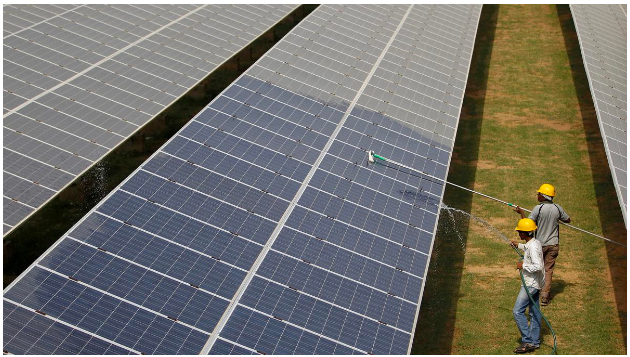Context:
2023 Union Budget has allocated ₹19,700 crore for the National Green Hydrogen Mission. This will set in motion a programme that can position India as a green hydrogen (super)power.
| Probable Question:
Green hydrogen is being termed the fuel of the future. Critically analyse India’s efforts in taking lead in production of green hydrogen. |

Image Source: The Hindu
What is green hydrogen and the difference between grey and blue hydrogen?
- Green hydrogen:
- It is defined as hydrogen produced by splitting water into hydrogen and oxygen using renewable electricity.
- This is a very different pathway compared to both grey and blue.
- Grey hydrogen:
- It is traditionally produced from methane (CH4), split with steam into CO2 – the main culprit for climate change – and H2, hydrogen.
- Grey hydrogen has increasingly been produced also from coal, with significantly higher CO2 emissions per unit of hydrogen produced.
- Blue hydrogen:
- It follows the same process as grey, with the additional technologies necessary to capture the CO2 produced when hydrogen is split from methane (or from coal) and store it for long term.
- It is not one colour but rather a very broad gradation, as not 100% of the CO2 produced can be captured, and not all means of storing it are equally effective in the long term.
Significance:
- Green hydrogen holds the promise of fuelling industrial growth while simultaneously reducing industrial emissions.
- It can serve as an energy source (heavy industry, long distance mobility, aviation, and power storage) and an energy carrier (as green ammonia or blended with natural gas).
About National Green Hydrogen Mission:
- It is a program to incentivise the commercial production of green hydrogen and make India a net exporter of the fuel.
- The Mission will facilitate demand creation, production, utilization and export of Green Hydrogen.
Sub Schemes:
- Strategic Interventions for Green Hydrogen Transition Programme (SIGHT):
- The mission introduces a Strategic Interventions for Green Hydrogen Transition (SIGHT) fund for five years, with ₹13,000 crore as direct support to consume green hydrogen.
- It will fund the domestic manufacturing of electrolysers and produce green hydrogen.
- The mission allocates ₹400 crore for R&D, which can be leveraged to crowd in private capital into technology codevelopment.
- This will encourage heavy industries to increase demand, offering economies of scale by which suppliers can reduce prices.
- Green Hydrogen Hubs:
- States and regions capable of supporting large scale production and/or utilization of hydrogen will be identified and developed as Green Hydrogen Hubs.
- The mission envisions green hydrogen hubs to consolidate production, end use and exports.
- A mission secretariat can ensure project clearance is streamlined and reduce financial risks.
Challenges:
- Transportation Cost: Majority of low-cost renewable energy resources are located far from potential demand centres. As a result, the cost of transportation from the plant to the demand centre rises.
- High cost of production: The technology used in production of green hydrogen is still in its early stages and is costly, which raises the cost of production.
- Storage related issues: External energy source is required to isolate hydrogen: It does not occur naturally as a gas on the Earth. It is always in combination with other elements such as water (H2O).
- Low production of Electrolysers: There is currently no major Indian manufacturer of Electrolysers (splits water into hydrogen and oxygen).
- As a result, India is reportedly importing electrolysers, which makes the cost uneconomical. China could end up controlling 38% of electrolyser capacity by 2030.
- Absence of common global frameworks: Attempts for rules and standards are being driven by collectives of private corporations rather than through structured intergovernmental processes. There are already signs of conflicting regulations and protectionist measures in major markets.
- Green hydrogen production projects announced/underway in India are far fewer compared to others.
Way Forward
- Bilateral Partnerships: India should establish bilateral partnerships to develop resilient supply chains, technology transfer. Using yen or euro denominated loans for sales to Japan or to the EU, respectively, could reduce the cost of capital and help us become export competitive.
- Improvement of Electrolyser technology: Electrolyser technology must be improved to achieve higher efficiency goals, specific application requirements, be able to use non freshwater, and substitute critical minerals.
- Joint projects in countries with good renewable energy resources.
- Nudging government procurement towards green steel: A share of government procurement of steel could be nudged towards green steel. India could later position itself as a green steel exporter.
- Developing rules for a global green hydrogen economy: India must coordinate with major economies to develop rules for a global green hydrogen economy.
- India must cooperate with like minded countries on trade, value chains, research and development, and standards.
- India’s G20 presidency is an opportunity to craft rules for a global green hydrogen economy.
- These rules must address operational threats, industrial competitiveness and strategic threats.
- Promotion of a global network on green hydrogen: India should promote a global network on green hydrogen via which companies could collaborate. Green hydrogen will be a critical industrial fuel of the 21st century.
News Source: The Hindu
![]() 7 Mar 2023
7 Mar 2023
